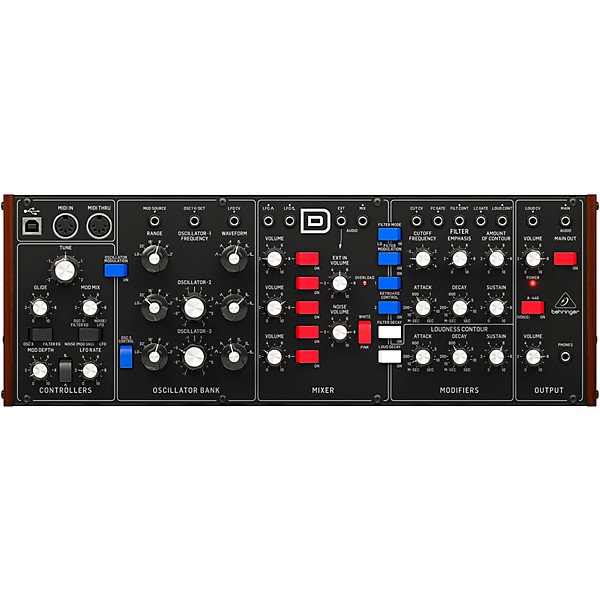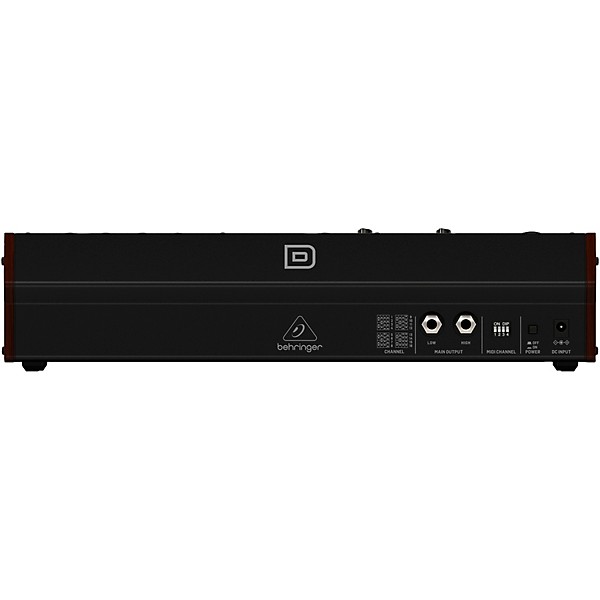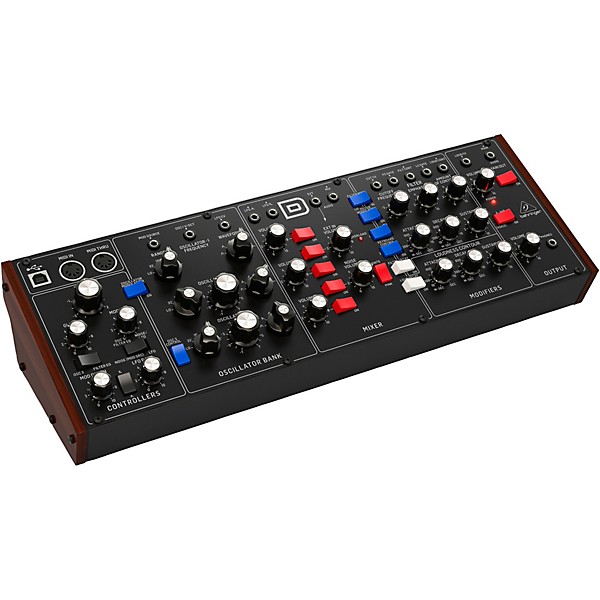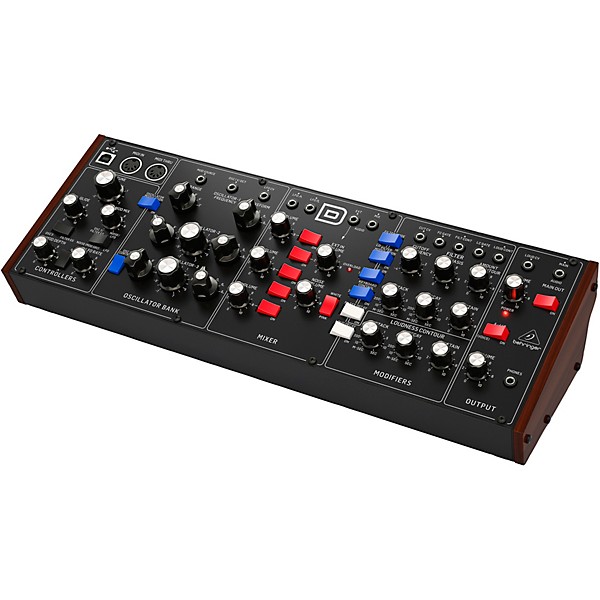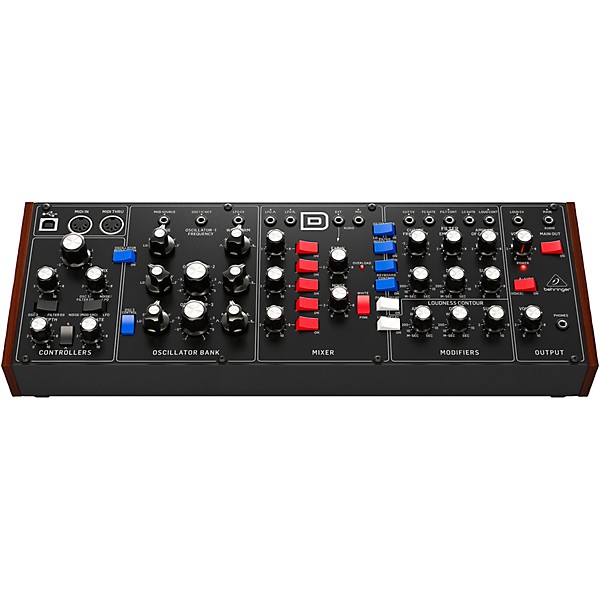- Popular Brands
Behringer Model D Analog Synthesizer

Description
Behringer's MODEL D Analog Synthesizer is inspired by Moog's classic Minimoog Model D. At a welcome price, this Eurorack-sized synth continues in the Moog tradition by introducing analog synthesis to a new generation of music makers. Like the original, Behringer's MODEL D is outfitted with incredible features and has a rich analog sound. It differs from the original in its Eurorack design - a design that removes the keyboard feature, increasing portability. In its place, the synth can be connected to and controlled by any number of synth controllers or USB devices via a USB-MIDI port.

True to the original
Designed and engineered in the U.K., this is an authentic reproduction of the original “D Type” circuitry with matched transistors and JFETs; 5 variable oscillator shapes with variable pulse widths; ultra-high precision 0.1% Thin Film resistors and Polyphenylene Sulphide capacitors; a pure analog signal path based on authentic VCO, VCF and VCA designs; a dedicated, fully analog triangle/square wave LFO with switchable low/high pass filters; a classic 24dB ladder filter with resonance; overdrive circuitry; low and high-level outputs with signal integrity stages; and a pink/white noise generator. This highly-focused attention to detail is what gives the MODEL D its ultra-flexible sound shaping capability, which covers everything from super-fat bass and lead tones, stunning effects, progressive organ sounds – and all the way out to the otherworldly sounds of your imagination. The result is a synth that produces legendary sound performance with expansive sonic possibilities.

Creative expression and expansion
MODEL D’s 3 highly-flexible Voltage Controlled Oscillators (VCOs) provide an incredible range of 5 waveforms for sculpting the perfect sound. Oscillators 1 and 2 options include: triangular; triangular/saw; saw; square; wide pulse; and narrow pulse, while OSC 3 features: triangular; reverse saw; saw; square; wide pulse; and narrow pulse. Additionally, all 3 VCOs can be adjusted across an extremely-wide, 6-octave range (LO, 32', 16', 8', 4', and 2'). This amazing flexibility gives you all the tools you need to be your creative best. Designed around an intuitively-linear workflow, MODEL D benefits greatly from its semi-modular design, which requires no patching for immediate performance. Just connect your favorite keyboard or computer via MIDI over DIN or USB – and start exploring the world of analog music synthesis right out-of-the-box. You can also take advantage of the synth’s analog circuitry by using the external audio input to process sounds from external sources, adding warmth and depth to any number of instruments. Like its predecessor, the Behringer Model D offers a classic sound—one that forged new musical genres and inspired artists like Dr. Dre, Kraftwerk, LCD Soundsystem, Trent Reznor and Gary Numan, to name a few.
Features
- 3 Voltage-Controlled Oscillators (VCO);
- A classic 24dB Voltage-Controlled Filter (VCF) with resonance
- Filter selectable for low-pass or high-pass
- Overdrive circuit
- White and/or Pink Noise generator
- USB-MIDI plus 5-pin DIN In and Thru
- External input for processing outside sounds
- 3-year warranty program
Specs
- Polyphony: 1 voice
- VCO: 3
- VCF: 1
- Envelope Generator (EG): Yes
- LFO: 1
- Mixer: Yes
- Included presets: Not Specified
- User preset slots: Not Specified
- Output: Yes
- MIDI Connectivity: Yes
- Line input: Yes
- USB Connectivity: Yes
- Headphone out: Not Specified
- Other: Not Specified
- Sequencer: Not Specified
- Arpeggiator: Not Specified
- Display: Not Specified
- Effects: Not Specified
- Pitch bend/Modulation: Yes
- Width: Not Specified
- Height: Not Specified
- Depth: Not Specified
- Weight: Not Specified
Reviews
4.28
32 Reviews
83%
of respondents would recommend this to a friend
Most Liked Positive Review
Much better than the Moog reissue
This little synth is amazing! The real deal. I have an original vintage Minimoog model D and I dialed in the same settings and literally could not believe my ears. If you have any doubts look up the demo on YouTube of synthpro testing this against a real one. I had originally bought the Moog reissue for $3500 and returned it for this. The reissue has no snap in its release envelopes, this one and the vintage do. That snap is what really adds the "funk" for the Moog bass, it's absolutely essential. Major oversight by Moog.
Most Liked Negative Review
Plastic toy that simulates a moog
In case you might think I just gave this a cursory try, I purchased it at GC. Hated it and sold it. Purchased it again a year later on a price point similar to what is up now. Same problems: oscillators very hard to keep in tune with each other. I have over forty Moogs, Arps, Sequential, Oberheim, Korg, Waldorf, Roland, Yamaha etc vintage and recent boards, and also a few Behringers. The UBXa is quite nice as is the Monopoly. So I am not anti-Behringer, but I do know a low end synth when I play one. Anyone who claims this thing sounds like a Moog Minimoog, be it a reissue or original either hasn't played a real one or this is their first synth. Nobody in their right mind A/Bing this side by side would ever think this is anywhere close to a Minimoog. There is a solidity to a real Moog (the Model D is a fragile plastic toy) and a richness to the oscillators in a real moog that this is lacking. The positives: This is an interesting beginner synthesizer that can do some things other cheap synths can't due to the three oscillators. It has the same general layout as a minimoog which is good for learning synthesis on. The negatives: tuning is a mess. I had an oscillator go dead nearly immediately. Generally fragile and sketchy build quality. You need a midi keyboard to run it. The fact there are a TON of these on Guitar Center Used should tell you something. Definitely not recommended for a main synth but if one is really cheap and you are in need of a second synth, give it a try. But remember, I warned you.
- Electronic Music19
- MIDI14
- Accompaniment4
- Learning4
- Concerts3
- Difficult to Use1
- No Speakers1
- Tuning Issues1
- Had to return it to the manufacturer1
- No problem1
- Experienced13
- Professional Musician9
- Novice2
- Easy to Use16
- Good Audio14
- Portable13
- Responsive / Good Action6
- Nice sound1
Reviewed by 32 customers
Plastic toy that simulates a moog
submitted9 months ago
byBionaut
fromMass
In case you might think I just gave this a cursory try, I purchased it at GC. Hated it and sold it. Purchased it again a year later on a price point similar to what is up now. Same problems: oscillators very hard to keep in tune with each other. I have over forty Moogs, Arps, Sequential, Oberheim, Korg, Waldorf, Roland, Yamaha etc vintage and recent boards, and also a few Behringers. The UBXa is quite nice as is the Monopoly. So I am not anti-Behringer, but I do know a low end synth when I play one. Anyone who claims this thing sounds like a Moog Minimoog, be it a reissue or original either hasn't played a real one or this is their first synth. Nobody in their right mind A/Bing this side by side would ever think this is anywhere close to a Minimoog. There is a solidity to a real Moog (the Model D is a fragile plastic toy) and a richness to the oscillators in a real moog that this is lacking. The positives: This is an interesting beginner synthesizer that can do some things other cheap synths can't due to the three oscillators. It has the same general layout as a minimoog which is good for learning synthesis on. The negatives: tuning is a mess. I had an oscillator go dead nearly immediately. Generally fragile and sketchy build quality. You need a midi keyboard to run it. The fact there are a TON of these on Guitar Center Used should tell you something. Definitely not recommended for a main synth but if one is really cheap and you are in need of a second synth, give it a try. But remember, I warned you.
Needs lots of warmup time - then it rolls
Verified Buyer
submitteda year ago
byGlen
fromNY
Submitted as part of a sweepstakes
As the title says: this thing needs a lot of warmup time. It's not ready to play until about an hour after being turned on, it takes that long (at least on these cold winter days) to stabilize. But once it does, it's wonderful. So far there are no Minimoog sounds that I've heard that I've been unable to replicate. Given the low cost compared to the real thing, it's a great synth to have around.
Classic mini-Moog sounds for a fraction of the price
submitted5 years ago
byGary P
fromBoston Massachusetts area
Since my childhood in the Sixties, I have always been a knob turner, toggle switch flipper and button pusher. The analog synths of the seventies offered plenty of opportunities for those who were proficient at the activities listed above. The Behringer Model D offers the modern day musician or synth enthusiast the opportunity to experience and discover the mini-Moog's Classic sounds by touching the instrument and making the instrument an extension of themselves at a fraction of the price of a Moog synthesizer. This is no toy. This is the real deal. Get yours!
Unbelievable. Allowed me to cash on my Moog Model D Reissue.
submitted5 years ago
byJon
fromWashington DC
I paid $3k+ for a Moog Model D Reissue and I couldn't believe my ears when I heard this. I was able to sell my Moog and buy 3 of these and still have cash left over for other gear. Build quality is better than expected at this price. I also bought the Behringer Poly D but frankly, this rackmount version sounds better because of the way they lowered the output on the Poly D.
Love it to death!
submitted5 years ago
byChristophe
fromBoston, MA
Inspirational, great sounding and absolutely unbeatable at the price. Even apart from being MIDI-fied, it's even better than the original in one sense, in that there are enough CV I/O's that it's robustly semi-modular. I have some Doepfer equipment as well as a set of Moogerfoogers, all on the 1V/octave standard and they play together like old friends. Made for 3AM! Seriously, if you want some analog/CV to play with you just can't go wrong with this little sweetie, either as a starting point or an addition to an existing system.
Great until OSC 1 and 2 died.
submitted6 years ago
byCorymomo
fromMotown
Great sound for the price. The Oscillators drift a lot though. After a little over a year, Oscillators 1 and 2 are dead. Since I never registered, 3 year warranty is void. Guess I'll throw it in the recycling bin and stop buying Behringer.
Q&A
Have a question about this product? Our expert Gear Advisers have the answers.
submitteda year ago
asked bystro
fromOceanside, CA
Is the pitch bend really locked to a 5th as the one star reviewer stated?
I’m sorry, I don’t know. I don't have one to check.submitted7 years ago
asked byRude Boy
fromGlendale, CA
Hello, Is this a brand new in the box unit or a demo or returned one? Thanks
This is a open box item


